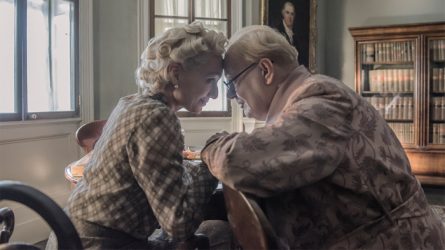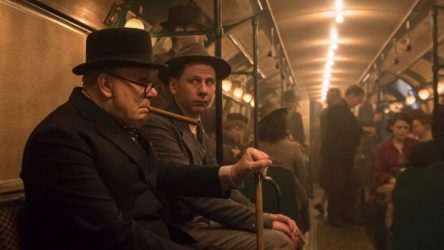In Darkest Hour, Winston Churchill characterizes the antithesis of university students the world over, and succeeds in making a series of intelligent decisions whilst extremely drunk. The film captures the crushing pressure borne by Churchill at a time when Britain seemed small and alone in the face of a military supremacy never-before encountered in history. At times, though, the gravity of the subject matter is betrayed by sense of ham-fisted awkwardness that rings hollow to even the most forgiving of audiences.
As a stereotypical, blindly patriotic British man, the bar is ludicrously low for me when it comes to Second World War subject matter. It doesn’t take much to reduce me to a blubbering mess of a half-baked nationalist sentiment, and thus I had high hopes for Darkest Hour. Added to this was the prospect of watching the unassailable Gary Oldman play another bumbling, but competent member of the British government establishment, a la George Smiley in Tinker Tailor Soldier Spy. Yes, I was practically salivating. Basically, the movie had a winning hand right from the flop, and in many respects it gets things bang on.

Let’s start with the good.
Predictably, Oldman doesn’t disappoint. Churchill was by all accounts an extremely eccentric and difficult man. He was loved my many, but utterly despised by an equal number of those with whom he worked. He was an unapologetic supporter of the Empire, and had been responsible for a large number of highly controversial decisions during his tenure as First Lord of the Admiralty- a prime example being the Gallipoli campaign, which resulted in over 120,000 British casualties during the First World War. Nonetheless, Churchill’s intransigence, when set upon a course of action, proved one of his greatest traits during WW2 – especially whilst successive members of his cabinet lost their nerve and flip-flopped like Mitt Romney on a crystal-meth comedown.
By and large, Oldman has this on lock, portraying a private doubt and terror counterpoised by public defiance and resolution. His performance captures Churchill’s myriad oddities without ever seeming affected or overstated. He understands more than almost any other actor working in Hollywood how to truly assimilate with his study, and the results are exceptional. Other performances are similarly engaging, and the film overall moves at a decent pace by never losing sight of the advancing threat across the Channel.
It is impossible to proceed any further in this review without speaking of The Scene. There is, tragically, one scene so comically and criminally bad that it feels like having someone empty a bucket of cold sick on your face while you doze on a warm beach. I speak, of course, of the Underground Scene. Towards the end of the film, and before Churchill makes his final decision to draw a line in the sand with Nazi Germany, he is depicted as taking a trip on the London underground.
During this unfortunate passage the British public at large tells him what they think of “orrible itler”. It’s impossible to conceive people leaving the test-screening and not immediately writing outraged letters to their Congressmen, such was the tone-deaf idiocy of this scene. Given the quality of the film overall, it’s forgivable, but only just as it very nearly succeeds in undermining Churchill’s triumphant final speech in Parliament. Even so, Churchill’s victorious exposition appears to have been based on the opinions of the half-witted troglodytes on day-release from a nearby institution whom he met on the underground, and is occasionally difficult to take seriously as a result. Thankfully, the film recovers from this hideous wrong note and finishes on a high note, as the Government finally comes together and elects to fight fire with fire.

There can not, in my opinion, be too many Second World War films produced. The sheer scale of the conflict gave rise to so many stories that need to be told. It is also important that, in this age of online battles and social-media reality, we are reminded of what true adversity and suffering is. Darkest Hour adds another valid and well-executed dimension to this tradition, showing how even the strongest and most determined of leaders must grapple with paralyzing uncertainty and self-doubt. Winston Churchill would be an easy character to parody, even by accident, and Oldman’s performance skillfully sidesteps this risk at every point.
The story is one that needs to be told, and here it is told well, with a script eschewing large-scale action set-pieces in favor of exploring the human frailty behind geopolitically significant moments in history. It’s well worth watching, but if you need the toilet during the film, try to hold it until roughly 115 minutes in, and you may save yourself an unfortunate cinematic low point in an otherwise excellent film.